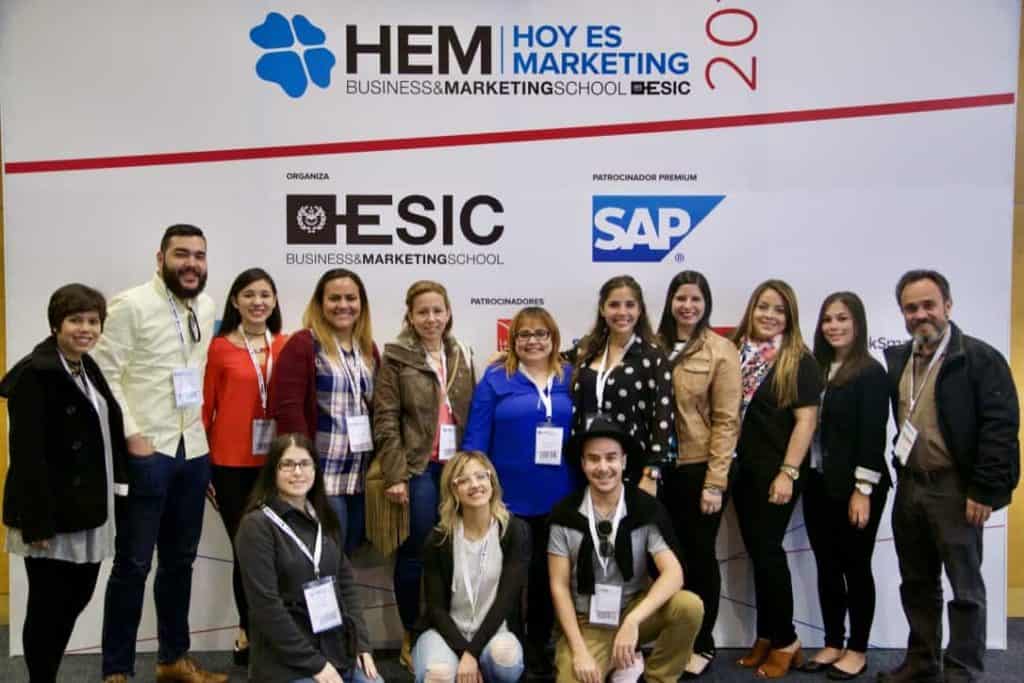Another alternative to traditional study abroad.

By Internationalization and Intercollegiate Relations
For years at Sagrado Corazón University, we have provided opportunities for students to have a meaningful international experience while studying with us. Some of these experiences are born from a collaboration between members of the faculty and the Office of Internationalization and University Relations (OIRI, Spanish acronym) and include academic trips guided by a professor.
Destinations such as Mexico, Spain, and New York are among the possibilities in which students explore a discipline from another cultural perspective for a period of 7 to 14 days. One of the promoters of this type of academic exploration abroad is Dr. Gabriel Paizy, director of the Ferré Rangel School of Communication and who, for a decade, has taught the course called “International Experience” at the Master’s degree level.
“This course is what we call a triangular experience because it covers academic, business, and cultural aspects. In coordination with the Complutense University of Madrid, we immerse ourselves in mass communication issues and visit such important media outlets as the El País newspaper and Televisión Española, as well as doing a cultural immersion both in Madrid and in other cities,” said Paizy.
Although the COVID-19 pandemic currently prevents travel to other countries, at Sagrado we have found ways to bring the world into the classroom.
“Sagrado offers extraordinary tools for students interested in living an international experience, such as study abroad, academic trips, or through platforms such as Zoom, which have facilitated so much for us in these times. In the course that I offer as part of the Master of Public Relations, for example, we have had master classes with the participation of such prominent professionals as the communication director of the Prime Minister of France, the communication director of the Barcelona City Council, and the press director of the Spanish Congress of Deputies, among others,” recalled Paizy.
“Having international contacts, whether by traveling or virtually, allows the student to broaden the range of knowledge about their field of study. The disciplines are not approached in Puerto Rico in the same manner in which they are in Europe, Asia, or Africa.”
Doctor Gabriel Paizy
Director of the Ferré Rangel School of Communication
As a teacher, Paizy has witnessed the change that his students experience after being exposed for a few days to other perspectives. “The experience ends with writing a reflective journal, and it is impressive to read how their lives are transformed in such a short time. They are not the same when they leave Puerto Rico and when they return. Their way of seeing life and the world changes because, what was previously imaginary is now something they have lived through and that is extremely enriching,” he said.
On a personal level, he stated having learned something new in each of the nearly 20 trips he has made with his groups. “Traveling is like reading. The more you do it, the better prepared you are to know and learn, to delve into certain topics, and that experience is only obtained by exposing yourself to other cultures and societies,” he added.
It is precisely this type of exposure that Paizy encourages in his students, other professionals, and even his children. “As a parent, I support 100% that my children can travel and have intercultural experiences. I know that, sometimes, parents fear letting go of our children, but fear should not be an impediment to allow them to grow academically and personally. There are very safe destinations that our children can explore while strengthening their maturity, their independence, and their abilities to fend for themselves.”
The skills and competencies that an individual obtains through internationalization have and incalculable value in the 21st century. In Sagrado, more and more professors seek to provide opportunities for the student community to recognize their role in the world through the integration of virtual collaborations between Sagrado’s faculty and universities abroad, and through their support for OIRI’s intercultural activities, its training in issues that have a global scope, and the aforementioned academic trips.
“We live in the era of globalization. We can no longer think solely within our shores because we are connected to the world. That is why it is essential that all students and professionals have that contact with other societies, cultures, and ways of seeing life. All of this enriches the experience of human beings,” Paizy pointed out.
Those interested in learning more about academic trips and other intercultural and interdisciplinary opportunities can visit www.sagrado.edu/internacional or write to internacional@sagrado.edu.